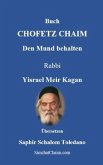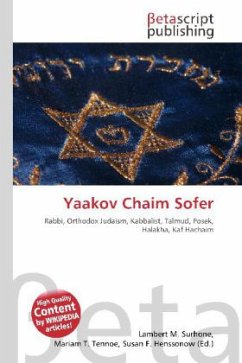The Rosh Rabbeinu Asher ben Yechiel was a prominent Talmudic commentator, posek, and one of the Ba'alei Hatosafot. He was born, lived, and taught in Germany, fleeing with his family to Spain after the imprisonment and death of his teacher, Maharam of Rothenburg. He served as the leading authority in Spain alongside the Rashba. Due to the tremendous impact of his work, Hilkhot HaRosh, his halakhic authority was so widely regarded that he was one of three sages selected by R. Yosef Karo to serve as the "Beit Din" for his Beit Yosef and Shulchan Arukh.Or Asher ben Yechiel, sometimes Asheri) (1250 or 1259 - 1327) was an eminent rabbi and Talmudist best known for his abstract of Talmudic law. He is often referred to as Rabbenu Asher, "our Rabbi Asher" or by the Hebrew acronym for this title, the Rosh (¿¿"¿, literally "Head"). His yahrzeit is on 9 Cheshvan.The Rosh was probably born in Cologne, Holy Roman Empire, and died in Toledo. His family was prominent for learning and piety, his father Yechiel was a Talmudist, and one of his ancestors was Rabbi Eliezer ben Nathan (the RaABaN). Asher had eight sons, the most prominent of whom were Jacob (author of the Arba'ah Turim) and Judah.Orchot Chaim, an essay on ethics, was written for his sons. It begins with the comment, "Distance yourself from haughtiness, with the essence of distancing." Orchot Chaim is today an important work of musar literature. ¿¿¿ ¿¿¿ ¿¿ ¿¿¿¿¿ (¿'¿', 1250 - ¿' ¿¿¿¿¿ ¿'¿"¿, 1327), ¿¿¿¿¿¿ ¿¿¿"¿, ¿¿¿ ¿¿¿¿¿¿ ¿¿¿¿¿ ¿¿¿¿¿¿ ¿¿¿¿¿¿¿¿ ¿¿¿¿ ¿¿¿¿¿ ¿¿¿¿¿ ¿¿ ¿¿¿¿¿ ¿¿¿¿¿ ¿¿¿¿¿¿¿ ¿¿¿"¿ ¿¿¿¿ ¿¿¿¿¿¿, ¿¿¿¿ ¿¿¿¿¿¿, ¿¿¿ ¿¿¿¿¿ ¿'¿'-¿'¿'. ¿¿¿¿ ¿¿¿ ¿¿¿¿¿ ¿¿ ¿¿¿¿ ¿¿¿ ¿¿¿¿ ¿¿¿¿¿ ¿¿¿¿ ¿¿¿¿¿ ¿¿¿¿¿ ¿¿ ¿¿¿¿¿ ¿¿¿¿. ¿¿¿¿ ¿¿¿ ¿¿¿ ¿¿¿¿ ¿¿¿¿¿¿¿¿ ¿¿¿¿¿¿¿ ¿¿¿¿¿ ¿¿¿ ¿¿¿¿¿ ¿¿¿¿¿. ¿¿¿¿ ¿¿¿¿¿¿¿ ¿¿¿ ¿¿¿¿¿¿ ¿¿ ¿¿¿ (¿¿¿¿"¿) ¿¿¿ ¿¿¿ ¿¿¿¿ ¿¿¿¿¿¿ ¿¿¿¿¿¿ ¿¿¿¿ ¿¿¿ ¿¿¿"¿ ¿¿¿ ¿¿¿¿ ¿¿¿ ¿¿¿¿¿. ¿¿¿¿¿ ¿¿¿ ¿¿¿¿¿ ¿¿¿¿¿¿¿ ¿¿ ¿¿¿¿"¿ ¿¿¿¿¿¿¿¿¿, ¿¿¿¿ ¿¿¿¿¿ ¿¿¿¿¿ ¿¿¿¿¿¿ ¿¿¿¿¿¿ ¿¿¿¿¿¿ ¿¿¿¿¿ ¿¿¿¿¿¿, ¿¿¿ ¿¿¿¿ ¿¿¿ ¿¿¿¿¿¿¿ ¿¿¿¿¿¿. ¿¿¿ ¿¿¿ ¿¿¿¿¿¿¿ ¿¿¿¿ ¿¿¿¿ ¿¿¿¿¿ ¿¿¿¿¿ ¿¿¿¿¿¿, ¿¿¿ ¿¿¿¿ ¿¿¿¿¿¿ ¿¿¿¿¿¿ ¿¿¿¿¿¿ ¿¿¿¿¿¿. ¿¿¿¿¿ ¿¿¿¿¿ ¿¿¿¿ ¿¿¿"¿ ¿¿¿¿¿ ¿¿¿¿¿ ¿¿¿¿¿ ¿¿ ¿¿¿¿"¿, ¿¿¿ ¿¿¿¿ ¿¿ ¿¿¿¿¿ ¿¿¿¿¿ ¿¿¿¿ ¿¿¿¿¿¿¿. ¿¿ ¿¿¿¿¿¿ ¿¿¿¿ ¿¿¿¿ ¿¿¿¿"¿ ¿¿¿¿ ¿¿¿¿¿¿ ¿¿¿¿¿ ¿¿¿¿ ¿¿¿¿¿ ¿¿¿¿ ¿¿¿¿¿¿¿ ¿¿¿¿ ¿¿ ¿¿ ¿¿¿ ¿¿¿¿ ¿¿¿¿¿¿ ¿¿¿¿¿ ¿¿ ¿¿¿¿¿¿ ¿¿¿ ¿¿¿¿¿ ¿¿¿¿ ¿¿¿, ¿¿¿¿ ¿¿¿¿¿, ¿¿¿¿ ¿¿¿¿¿¿, ¿¿¿¿ ¿¿¿¿¿¿, ¿¿ ¿¿¿¿ ¿¿¿, ¿¿¿¿¿ ¿¿¿¿ ¿¿¿¿ ¿¿¿¿¿ ¿¿¿¿ ¿¿¿¿¿¿, ¿¿¿ ¿¿¿¿¿ ¿¿¿¿ ¿¿ ¿¿¿¿¿, ¿¿¿ ¿¿¿¿ ¿¿¿¿¿, ¿¿¿¿ ¿¿¿¿¿ ¿¿¿¿¿ ¿¿¿ ¿¿¿¿¿¿ ¿¿¿¿¿, ¿¿ ¿¿ ¿¿ ¿¿¿¿¿¿ ¿¿¿¿ ¿¿¿¿¿ ¿¿¿¿¿ ¿¿¿¿ ¿¿¿ ¿¿¿¿¿, ¿¿¿¿¿ ¿¿¿¿¿¿¿ ¿¿¿¿ ¿¿¿ ¿¿¿ ¿¿¿ ¿¿¿¿¿, ¿¿¿ ¿¿¿ ¿¿¿¿ ¿¿ ¿¿¿¿ ¿¿¿¿¿¿ ¿¿¿ ¿¿¿¿ ¿¿ ¿¿ ¿¿¿¿¿¿

![Orchot Chaim L'HaRosh [English with Hebrew] - ben Yehiel, Rabbeinu Asher Orchot Chaim L'HaRosh [English with Hebrew] - ben Yehiel, Rabbeinu Asher](https://bilder.buecher.de/produkte/69/69767/69767557n.jpg)
![Sefer HaChinukh - Part C Mitzvahs 401-613 [English & Hebrew] Sefer HaChinukh - Part C Mitzvahs 401-613 [English & Hebrew]](https://bilder.buecher.de/produkte/69/69804/69804877m.jpg)
![Sefer HaChinukh - Part B Mitzvahs 208-400 [English & Hebrew] Sefer HaChinukh - Part B Mitzvahs 208-400 [English & Hebrew]](https://bilder.buecher.de/produkte/69/69796/69796734m.jpg)
![Sefer HaChinukh - Part A Mitzvahs 1-207 [English & Hebrew] Sefer HaChinukh - Part A Mitzvahs 1-207 [English & Hebrew]](https://bilder.buecher.de/produkte/69/69807/69807089m.jpg)



